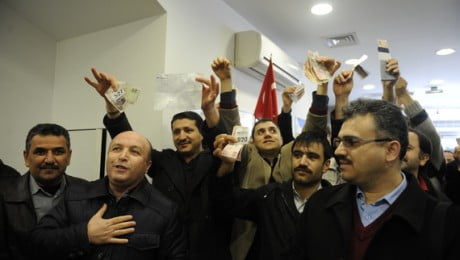Keyword: Democracy

Another Victim of Erdogan’s Wrath
Erdoğan’s unceasing bid to bury the bank is largely driven by his declared witch-hunt against institutions affiliated with the Gülen movement. In the latest twist to a saga, a banking watchdog ordered the state insurance fund to take over the management of the bank.

Dozens of US Congress members urge Kerry to press Turkey for freer media
A large number of members of the US Congress have voiced concerns on the recent arrest of media members in Turkey and called on Secretary of State John Kerry to press the Turkish government to secure press freedom in the country.

Bank Asya seeks immediate return of ‘hijacked’ management rights
Turkey’s largest Islamic lender, Bank Asya, is demanding that the state-run Savings Deposit Insurance Fund (TMSF) return the bank’s rights to control its management following strong indications that the fund’s decision on Tuesday to take over control of the lender’s board has no legal basis and is politically motivated.

Fethullah Gülen on Islam, democracy and freedom of speech
Publishing a book in 2009 about Francis of Assisi’s peaceful encounter with Egypt’s Sultan Malik al-Kamil during the Fifth Crusade led me to meet a lot of people with an interest in improving interreligious relations. Among them were a number of Turkish immigrants who are followers of the Islamic scholar Fethullah Gülen. I observed that through a network of private schools, foundations and media organizations, they have worked very hard to improve Muslim-Christian relations.

Gülen movement discussed at EP in light of recent political developments in Turkey
A panel discussion was organized by the Brussels-based Intercultural Dialogue Platform in the European Parliament (EP) to give information about the faith-based Gülen movement, also known as the Hizmet movement, especially within the framework of recent developments in Turkish politics.

Separation politics and Islam makes Gülen AKP’s enemy
“The Gülen Movement is faith inspired in its motivation, but faith neutral in its manifestation.” That is how key speaker Ozcan Keles, chairperson of Dialogue Society in London, characterized the Gülen Movement in a panel discussion on the Hizmet Movement Tuesday in the European Parliament.

Gülen says Turkey’s democracy eroding under AK Party rule
Turkish Islamic scholar Fethullah Gülen has said Turkey, which was not long ago the envy of Muslim-majority countries with its bid to become an EU member and dedication to being a functioning democracy, is reversing progress and clamping down on civil society, the media, the judiciary and free enterprise under the rule of the governing Justice and Development Party (AK Party).

Fethullah Gulen: Turkey’s Eroding Democracy (op-ed in NY Times)
It is deeply disappointing to see what has become of Turkey in the last few years. Not long ago, it was the envy of Muslim-majority countries: a viable candidate for the European Union on its path to becoming a functioning democracy that upholds universal human rights, gender equality, the rule of law and the rights of Kurdish and non-Muslim citizens.

Pro-gov’t circles intensify hypocritical propaganda targeting Gülen movement
The pro-government media and Justice and Development Party (AK Party) circles continue to use hypocritical language against the faith-based Gülen movement — popularly known as the Hizmet movement — inspired by the views of Turkish Islamic scholar Fethullah Gülen, in propaganda both abroad and at home.

Gülen’s lawyers refute justice minister’s statement likening Gülen to Iran’s Khomeini
Lawyers for Turkish Islamic scholar Fethullah Gülen have said via Twitter that Justice Minister Bekir Bozdağ should have provided proof to back up his statement that Gülen planned to return from the US to Turkey in a similar way to Iran’s revolutionary leader Ayatollah Ruhollah Khomeini.

War on Gulen Movement undermines Turkish diplomacy
Bent on dismantling the “parallel state,” Ankara has embarked on a reckless campaign that threatens to undermine Turkey’s foreign relations. After corruption probes targeted Cabinet members in December 2013, it came as no surprise when the AKP government dismissed and reassigned thousands of police officers, prosecutors and judges in the course of a fierce war on the movement of cleric Fethullah Gulen.





















